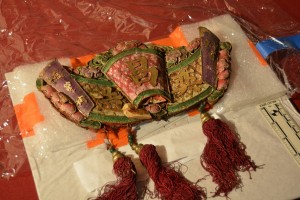Principal Investigators: Charlotte Sunseri, AJ Faas, Jan English-Lueck
Project Partner: New Museum of Los Gatos (NUMU)
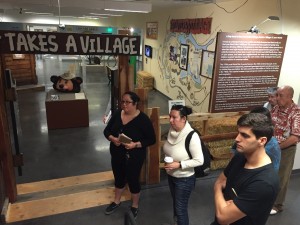
Description:
A research team—made up of anthropologists at San Jose State University, historians at NUMU (New Museum of Los Gatos), and American Indians relocated to San Jose since 1960—are teaming up this Spring to prepare a museum exhibit on an overlooked American Indian experience. The Urban Relocation Project (or Indian Relocation Act of 1956) reportedly helped relocate Native communities’ young adults to provide work opportunities outside reservations and push assimilation into mainstream American society, but the consequences of cultural disruption have not been fully studied. The relocatees and social scientists in this project are working together to understand how participants managed life outside established kin networks, navigated social identity construction, built a Bay Area pan-Indian community, and organized collective action and advocacy (e.g. American Indian Movement activism). The results of this study will include a NUMU museum exhibit in September 2016 and creation of an archive collection of relocatees’ oral histories. San Jose and San Francisco were among the handful of cities selected for this program, and the museum exhibit will feature the stories of individuals who experienced this program and its legacies to their children and grandchildren. The research and its outcomes—including oral histories, exhibit stories, and lines of inquiry—are driven by a joint partnership with the relocatee community and are guided by the Indian Health Center of Santa Clara Valley’s Vernon Medicine Cloud and Al Cross.
Parking Matters
Principal Investigator: J.A. English-Lueck, Ph.D.
Project Team:
Gianina Bebb, Leah Grant, Jeffrey Greger, Chelsea Halliwell, Erika Harvey, Sarah Luce, Johnny Luna, Jamieson Mockel, Angela Moniz, Ari Pimentel, Alisha Ragland, Ailea Scheffler, Kelli Sullivan and Megan Watson.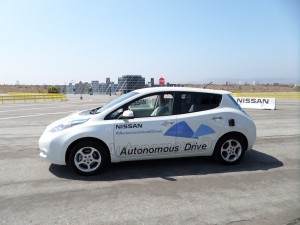
Project Partners:
Drs. Melissa Cefkin and Brigitte Jordan (Nissan Research Center)
Description:
In the tradition of the Anthropology department, this graduate seminar has a “client” that will work with the students to create an applied deliverable. Working with the Nissan Research Center, we are collaborating with SJSU Visiting Scholars, Drs. Cefkin and Jordan, who looking broadly at the social and cultural implications of autonomous vehicles. Forecasters imagine that autonomous fleet vehicles will affect parking, since they can be continuously booked and used. Yet, parking, as a social rather than a planning phenomenon, has been subject to only a few ethnographies. This graduate seminar studies such issues as adapting traditional research methods for special-purpose clients, human-centered service design, and heritage management and community engagement. The class has broken into research teams that explore facets of parking related to the course topic, creating mini-projects suitable to the class domains. These team projects include tracking historic changes in land use of the corner of San Fernando and Market, reimagining park and ride services, mapping emotional landscape of campus parking, and using an innovative experimental use of parking “mini-parks” to attract and engage people to think about the role of parking on community. Students will conduct their research, and share summaries and videos with the Visiting Scholars from the Nissan Research Center.
Continuity and Change in Community Leadership: The CommUniverCity Study
Principal Investigator:
A.J. Faas, Ph.D.
Project Team:
Chelsea Halliwell, Stephanie
Monterrosa, Jamieson Mockel,
DeDe Patterson, Ailea Scheffler,
and Elaine Foster
Project Partner:
CommUniverCity
Additional funding provided by the Laura Good Grant for Undergraduate Research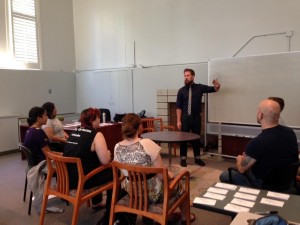
Description:
CommUniverCity is a collaborative partnership between the San José Council District Three neighborhoods (Comm), San José State University (Univer), and the City of San José (City). The San José Council District Three neighborhoods are home to roughly 96,000 residents, the majority (nearly 2/3) of whom have been identified as low income. This primarily Latino and immigrant community represents a key part of the shifting demographic profile of San José. District Three communities are also home to many grassroots leaders with ties to CommUniverCity and who have been engaged in protecting and developing their communities. Yet, as generations of community residents succeed one another, so too do generations of leadership. Concerned with the future of grassroots leadership in District Three, CommUniverCity has partnered with the Department of Anthropology at SJSU to develop a study of community leadership. Specifically, this study is designed to understand: (1) the attributes, capacities, and resources of established community leaders; (2) the attributes, capacities, and resources of emerging community leaders; (3) community leadership needs; and (4) the degree alignment between community leadership needs, established leadership, and emerging leadership. Ultimately, the study will attempt to determine how community members and leaders best work to foster the development of leadership to meet community needs. Because recent work on leadership has highlighted that there are different types of leaders in terms of the roles they play in the community network (e.g., conveners, thought leaders, and process facilitators), this study is designed to inductively determine what kinds of leaders exist in the community, what kinds of leaders are emerging, and the extent to which emerging leadership profiles correspond to established leadership profiles. Also, because leadership capacity is largely a product of community capacity and institutional and political contexts, this study will seek to identify the factors that facilitate or inhibit leadership capacities. Finally, because leadership capacities are appropriate to different needs, objectives, and contexts, this study will identify community needs and objects and explore the extent to which established and emerging leadership profiles correspond to these needs and objectives.
Living between Borders: Transnational Marriages and US Resettlement Patterns in Sudanese Refugee Populations
Principal Investigator:
DeDe Patterson
Partner Organization:
Hope with South Sudan
Faculty Sponsor:
A.J. Faas, Ph.D.
Description: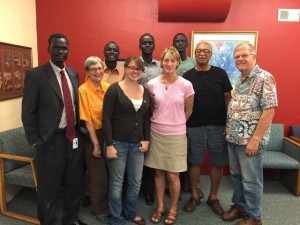
Many Sudanese refugees who have resettled in the US have actively sought to maintain their unique cultural identity while simultaneously working to integrate into American society through the pursuit of formal higher education and successful careers. One of the most interesting developments within this population is the desire and persistence to have a Sudanese family in order keep their cultural heritage and identity. The process for marriage is economically tiresome, and due to strict immigration policies, often forces each family member to live transnational lives. Systems of trans-continental arranged marriages and married life allows Sudanese refugees to continue their cultural practices, to speak their native language within their home and community, and to create a Sudanese family that could one day return to South Sudan. Despite the economic strain these efforts have on the relationship between husband and wife, they can be culturally empowering to the members in this community and their families that live elsewhere in the world. Even decades after integration into American society, their ties to their homeland and to their people still remain a top priority in their lives. Efforts of resettlement and the attempts to continue cultural and social ties to their homeland despite time and distance is changing the face of the immigrant and the minority American, in addition to altering the role of family in Sudanese culture. The goals of this research are to describe and analyze the practice of transnational marriage and the extent that resettlement in the US is changing the role of women in Sudanese communities.
As a result of her study and collaboration with Hope with South Sudan, DeDe was invited to join the Board of Directors in August 2015.
Bok Kai Temple Cultural Heritage Documentation
Primary Investigators:
Michael Boero and Robert Gelb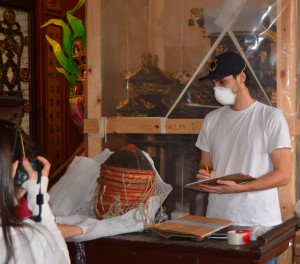
Faculty Sponsors:
Dr. Marco Meniketti
Project Background:
Bok Kai Temple in Marysville, Ca. has served the Chinese
community in the region since 1856. The current temple
itself dates to the 1880s. Over the years Bok Kai has collected hundreds of artifacts related to Chinese culture, festivals, and spiritual practices. San Jose State was selected by the board of directors to carry out the task of archaeologically documenting the collection and helping to identify the origins, use, and cultural significance of the objects, which range from decorative temple objects to silk and embroidered Opera robes, and from hats to lamps.
The internship is providing a glimpse into Chinese material cultural heritage in early California. The Bok Kai temple is an active temple with weekly worshipers arriving to pray and leave offerings and is on the National Register of Historic Places. Documentation by SJSU students will lead to comprehensive digital archive and searchable database along with recommendations regarding preservation, curation and display for planned museum.
